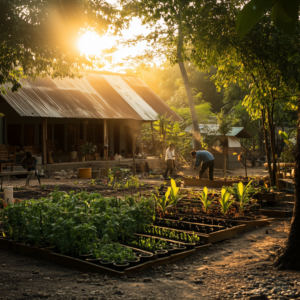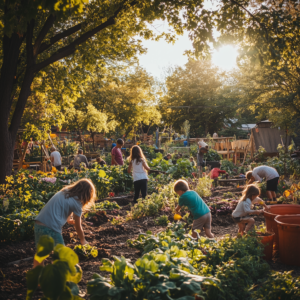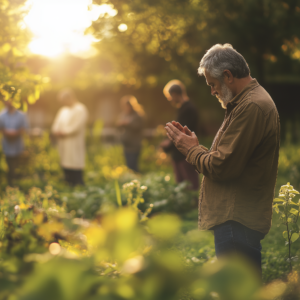A Detailed Description of Holy and Healthy Homesteads
At Holy and Healthy Homesteads, our mission is to cultivate self-sustaining communities rooted in faith, agriculture, and holistic living. We strive to create a world where churches can thrive independently, serve their communities, and pass on sustainable practices to future generations. Our approach is built on the principles of permaculture, community outreach, and spiritual growth, allowing us to address both physical and spiritual needs. Here’s how we plan to solve the problem of dependency, and what a thriving, self-sufficient community looks like.

The Problem: Dependency and Vulnerability
Many churches around the world rely heavily on external donations to meet their basic needs, leaving them vulnerable to financial instability. This dependency often results in several issues:
- Lack of Autonomy: Churches that depend on outside funding may feel obligated to cater to their donors’ preferences rather than the specific needs of their congregation and community. This can lead to a loss of local identity and autonomy, making it challenging for these churches to truly flourish. Proverbs 22:7 says, “The borrower is slave to the lender,” highlighting the importance of financial independence.
- Risk of Collapse: If donors face financial hardships or change their interests, the sudden withdrawal of funds can leave churches struggling to survive. Without a steady income source, these churches may be forced to shut down their programs, cut back on outreach, or even close their doors altogether. Proverbs 13:11 warns, “Wealth gained hastily will dwindle, but whoever gathers little by little will increase it,” emphasizing the importance of consistent, sustainable income.
- Stagnation in Community Development: When churches are preoccupied with securing funding, they often lack the resources and energy to invest in community development. This stagnation affects not only the church but the surrounding community, which misses out on valuable support, education, and opportunities.
- Dependency Creates Complacency: Churches that rely solely on donations may not prioritize developing local skills or resources, leading to a lack of initiative among community members. Over time, this can create a culture of complacency, where dependency on external support becomes normalized. Paul’s example in Acts 18:3, where he worked as a tentmaker, shows that even in ministry, self-sufficiency is essential: “And because he was of the same trade, he stayed with them and worked, for they were tentmakers by trade.”
The Route to Solve the Problem: Building Self-Sustaining Churches

At Holy and Healthy Homesteads, we believe that churches should be empowered to support themselves and their communities. Our strategy involves combining faith-based outreach with sustainable agriculture practices to create self-sufficient churches. Here’s how we plan to do it:
- Permaculture Training and Implementation: We offer training in permaculture, a system of agricultural and social design principles that utilize natural ecosystems. By teaching churches how to grow their own food using non-GMO crops and organic methods, we empower them to be less reliant on external food supplies. Permaculture not only provides food security but also promotes environmental stewardship and sustainability. Genesis 2:15 states, “The Lord God took the man and put him in the Garden of Eden to work it and take care of it.” This verse emphasizes our responsibility to care for the earth.
- Establishing Church-Run Farms: Each church we partner with will have the opportunity to establish a small farm adjacent to their property. These farms will serve multiple purposes: providing fresh produce for the church and community, generating income through the sale of surplus crops, and offering educational opportunities for children and adults alike. By integrating agriculture into their daily activities, churches become hubs of physical and spiritual nourishment. This is reflected in James 2:15-17, “If a brother or sister is poorly clothed and lacking in daily food, and one of you says to them, ‘Go in peace, be warmed and filled,’ without giving them the things needed for the body, what good is that?”
- Community Engagement and Education: Education is a critical component of our mission. We conduct workshops and seminars on sustainable living, health, and nutrition, equipping church members with the knowledge and skills to improve their quality of life. By engaging the broader community, we foster a sense of unity and shared responsibility for the well-being of everyone. The Biblical principle of loving our neighbors as ourselves (Mark 12:31) drives our commitment to community engagement.

- Spiritual Growth and Leadership Development: Alongside practical training, we emphasize the importance of spiritual growth. We provide resources for Bible study, prayer, and worship, ensuring that churches remain grounded in their faith. Leadership development programs help church leaders and members grow in their ability to guide their communities effectively, blending spiritual guidance with practical skills. Ephesians 4:12 guides this aspect of our mission: “To equip the saints for the work of ministry, for building up the body of Christ.”
- Creating a Support Network: Holy and Healthy Homesteads connects churches with one another, forming a support network that transcends geographical boundaries. This network allows churches to share resources, knowledge, and encouragement, building resilience and fostering collaboration. Ecclesiastes 4:9-12 reminds us of the strength in unity: “Two are better than one because they have a good reward for their toil.”
- Empowering Future Generations: By involving youth in farming activities and church leadership, we are planting seeds for the future. Teaching children about sustainable agriculture, entrepreneurship, and faith instills values that will guide them throughout their lives. This investment in the next generation ensures that the principles of self-sufficiency and faith continue to flourish. Proverbs 22:6 reinforces this: “Train up a child in the way he should go; even when he is old, he will not depart from it.
- Financial Independence through Diverse Income Streams: We encourage churches to develop diverse income streams, such as selling farm produce, hosting workshops, and offering community services. By creating multiple revenue sources, churches can achieve financial stability and invest in further growth and outreach. Philippians 4:12-13, where Paul speaks of learning to be content in every situation, underscores the value of being prepared for various circumstances.

What Success Looks Like: Thriving, Self-Sustaining Communities
When our mission is fully realized, the impact on churches and communities will be profound:
- Churches Flourishing Spiritually and Financially: Churches will no longer be reliant on external donations to survive. Instead, they will generate their own income through farming and other sustainable initiatives. This financial independence will allow churches to focus on their spiritual mission, expand their outreach, and support those in need without the constant worry of funding cuts. In 2 Corinthians 9:8, Paul writes, “And God is able to make all grace abound to you, so that having all sufficiency in all things at all times, you may abound in every good work.”
- Empowered Communities: Communities surrounding these churches will thrive. With access to locally grown, non-GMO food, people will experience improved health and nutrition. Educational programs will elevate knowledge and skills, leading to better job opportunities and economic stability. The sense of unity and shared purpose will strengthen relationships and foster a culture of mutual support. Galatians 6:10 states, “So then, as we have opportunity, let us do good to everyone, and especially to those who are of the household of faith.”
 A Legacy for Future Generations: The values of self-sufficiency, environmental stewardship, and faith will be passed down to future generations. Children who grow up in these communities will have a deep understanding of sustainable living and the importance of caring for God’s creation. They will be equipped to continue the mission of Holy and Healthy Homesteads, ensuring that these principles endure. Deuteronomy 6:6-7 highlights the importance of teaching our children: “And these words that I command you today shall be on your heart. You shall teach them diligently to your children.”
A Legacy for Future Generations: The values of self-sufficiency, environmental stewardship, and faith will be passed down to future generations. Children who grow up in these communities will have a deep understanding of sustainable living and the importance of caring for God’s creation. They will be equipped to continue the mission of Holy and Healthy Homesteads, ensuring that these principles endure. Deuteronomy 6:6-7 highlights the importance of teaching our children: “And these words that I command you today shall be on your heart. You shall teach them diligently to your children.”- Global Impact: As more churches adopt this model of self-sufficiency, the ripple effect will be felt worldwide. Holy and Healthy Homesteads will serve as a beacon of hope, demonstrating that it is possible to build resilient, thriving communities that honor God and care for His creation. Our network of churches will stand as a testament to the power of faith, hard work, and sustainable living. Matthew 5:16 encourages us to “Let your light shine before others, so that they may see your good works and give glory to your Father who is in heaven.”
Our mission at Holy and Healthy Homesteads is more than a plan—it’s a vision grounded in faith, aligned with Biblical truth, and dedicated to creating lasting change. We invite you to join us on this journey to empower churches, enrich communities, and honor God’s creation. Together, we can cultivate a world where churches not only survive but thrive, sowing seeds of hope, faith, and sustainability for generations to come.







